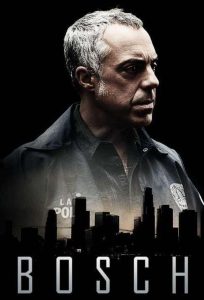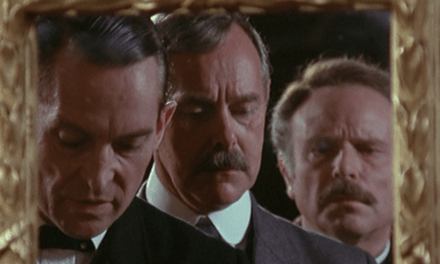Goliath. It began last year, and the second season became available this past northern summer. It’s on Amazon Prime, and boasts the signature of David E Kelley and Billy Bob Thornton, inter alios.
 The second season trailer brings home so much to me. I’ve stayed in the hotel where the protagonist lives and works. I’ve poked my nose into the sawdust-on-the floor cracker bar where he drinks. I’ve walked and ridden down almost every street featured in the first two seasons. Like Amazon’s Bosch, now in its fourth season, Goliath evokes LA, my lost home, in a way I’ve rarely seen, partly because the seediness I adored living both downtown and at the beach is allowed full play alongside the natural beauty and man-made (and I choose the compound adjective advisedly) gaudiness and dross of the city. In addition, there is the code.
The second season trailer brings home so much to me. I’ve stayed in the hotel where the protagonist lives and works. I’ve poked my nose into the sawdust-on-the floor cracker bar where he drinks. I’ve walked and ridden down almost every street featured in the first two seasons. Like Amazon’s Bosch, now in its fourth season, Goliath evokes LA, my lost home, in a way I’ve rarely seen, partly because the seediness I adored living both downtown and at the beach is allowed full play alongside the natural beauty and man-made (and I choose the compound adjective advisedly) gaudiness and dross of the city. In addition, there is the code.
The protagonists of both series are straightish, whiteish, maleish subjects. Well, actually, they’re straight white guys. Life has dealt them harsh cards. Sometimes they were really the dealers, other times not. One is an attorney, bibulous and impossible (Goliath), the other a detective, seething and impossible (Bosch). Both have adoring and adorable young daughters who are frustrated admirers of their hopeless dads, though one father is a bit of a hopeless deadbeat, whereas the other presents as a more dedicated, if flawed, soul.
In their tough exteriors and bravura looks and words, both Billy and Bosch are definitely purveyors—in fact masters—of ‘the code.’ Beyond scholarly semiotics, and specifically narratology, the code refers to a particular brand of righteous American masculinity—think William Powell in The Thin Man, Humphrey Bogart in Casablanca, The Big Sleep, and The Maltese Falcon, Richard Roundtree in Shaft, and the ultimate homage, Jack Nicholson in Chinatown. Clipped dialog, clipped delivery of it.
 Dashiell Hammett wrote the fiction that became two of those pictures. He set the terms for those who followed. Raymond Chandler, who drew so much on Hammett’s style and technique while transcending them, wonderfully called him an ‘ace performer’.
Dashiell Hammett wrote the fiction that became two of those pictures. He set the terms for those who followed. Raymond Chandler, who drew so much on Hammett’s style and technique while transcending them, wonderfully called him an ‘ace performer’.
Hammett had been a Pinkerton man, purportedly leaving due to their anti-leftist ways. The code that Pinkerton insisted on, and Hammett and Chandler’s men lived by, required that a chap neither cheat clients nor break or abide by laws in ways that might counter his sense of integrity; remain in the background; be objective; and avoid rough stuff where possible.
But remaining in the background is tough when you are hopelessly charismatic and folks want a piece of you (cue Powell, Bogart, Roundtree, Nicholson). The people you meet desire your attention and wish to understand you, to uncover the past that places barriers between you and intimacy, and break them down.
It’s easier to turn a little bit away from that attention; to live by a distant yet engaged integrity—a code that requires you not exploit people, pay respect to those who deserve it, and show contempt to those who don’t, without regard to their social station. But not open up to anyone.
This enchanting/frustrating/implausible/all-too-real version of masculinity fits the complex class politics of a largely invading/immigrant nation, where no one represents classy old money; not really. Or the deep confidence it brings with it. Violence is at the heart of every get-rich-quick scheme, and every scheme is really a scam. This is especially true of Los Angeles—the water and real-estate “deals” that complicate Chinatown and The Two Jakes are all too true of that benighted, beguiling place.
Billy and Bosch are white dudes, but they’re neither racist nor sexist. They’re ironist. The pain they feel, whether it be from the harshness of the world, from personal neuroses, or because of terrible trauma, is refracted to us all, albeit in a way that discloses little more than a shield and a vigorous propensity to stick up for oneself and the weak, in equal measure.
For these reasons and more, I really like and heartily recommend both Goliath and Bosch.
When and if Netflix slides into the ocean, as the mystics and statistics say it will, I believe Amazon Studios will still be standing, because it’s paid its bills—partly with money from Netflix. But that’s another story.
Toby Miller is Emeritus Distinguished Professor at the University of California, Riverside, the Sir Walter Murdoch Professor of Cultural Policy Studies at Murdoch University, Profesor Invitado at the Universidad del Norte, and Professor on the Institute for Media & Creative Industries at Loughborough University in London. His adventures can be scrutinized at www.tobymiller.org.





